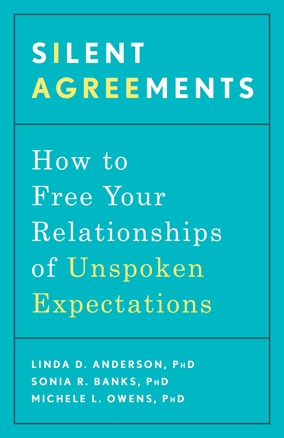Description
Silent Agreements will help readers define the unspoken beliefs and expectations that might be causing dissatisfaction, unhappiness, and resentment in their relationships, giving them the tools to explore these agreements and work toward healthier communication with a partner, friend, boss, or family member.
If you have relationships, you've likely been part of silent agreements. Silent agreements are the implicit "rules" of your relationships that arise from unspoken beliefs and expectations that both parties hold, stemming from your earliest experiences and reinforced as you mature. They can sound something like "The person who makes more money should pay for the dates," or "My boss doesn't offer me a raise, and he knows I won't ask for one." These agreements can hinder your relationships, remaining undiscussed due to fear, aversion to conflict, feelings of obligation, or guilt. Because expectations so rarely line up and neither person will address the issue, a silent agreement can cause unhappiness and resentment on both sides.
Clinical psychologists Drs. Anderson, Banks, and Owens will help you explore your agreements and work towards healthier communication with a partner, friend, boss, or family member. In the process, you'll learn more about your own motivations and how to dismantle the the beliefs that don't serve you. With guidelines and advice on how to have productive conversations about sex, money, commitment, family, the workplace, and health, this book will help you lift the silence and resolve those land-mine issues before they do irreparable damage.
About the Author
LINDA D. ANDERSON, PhD, is a professor, organizational manager, clinician, and consulting psychologist. She earned a doctorate in clinical psychology from Columbia University and has been in private practice for over 25 years, helping adults, adolescents, and children transform their lives.
SONIA R. BANKS, PhD, LCP , is a clinical and behavioral change consulting psychologist with over 25 years experience in private practice and organizational impact. She applies research trends to relationship science in her work with adolescent, couples, families, communities and organizational teams to support and build sustainable learning systems that advocate for their human potential.
Michele L. Owens, Ph.D., is a clinical psychologist in private practice in New York City with over 30 years of experience. She earned a bachelor of arts degree from Case Western Reserve University and both master's and doctoral degrees in clinical psychology from the Gordon F. Derner School of Psychology. She trains and mentors mental health professionals and presents workshops on subjects that include relationship enhancement, effective interpersonal communication, and living and working in a diverse world.
